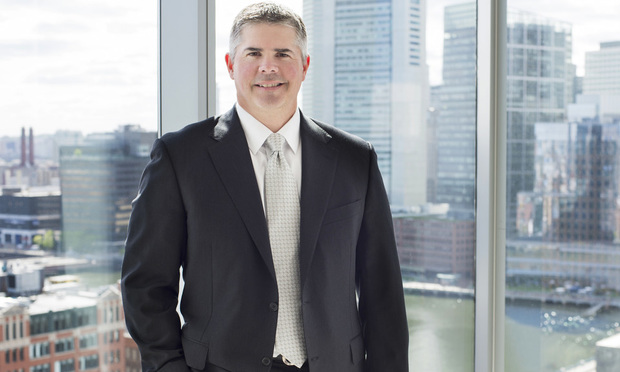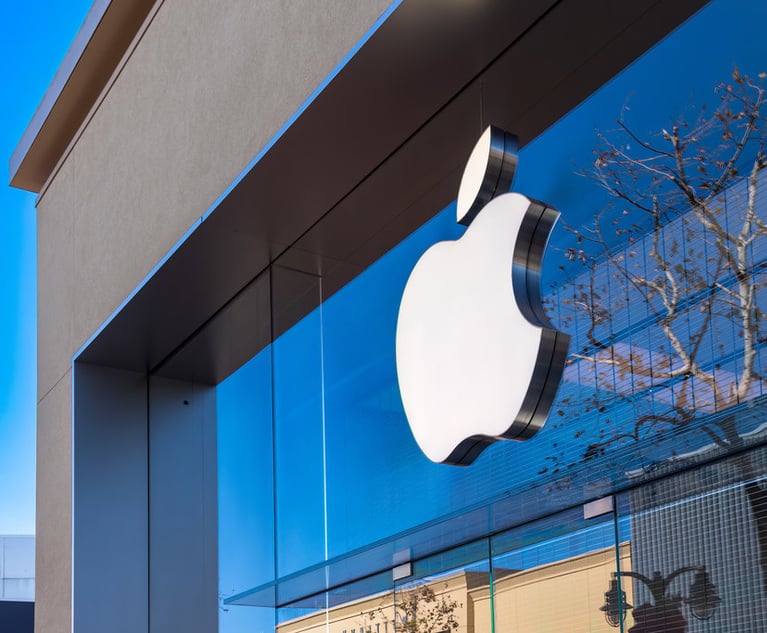How Fish & Richardson Found $175 Million After 15 Years
On behalf of San Jose electronics company Power Integrations, Fish's same core team soldiered through multiple high-dollar jury awards, an initial setback at the Federal Circuit eventually overruled by the Supreme Court, and the successful appeal of adverse PTAB decisions.
October 25, 2019 at 05:15 PM
4 minute read
 Frank Scherkenbach of Fish & Richardson/courtesy photo
Frank Scherkenbach of Fish & Richardson/courtesy photoFifteen years ago, San Jose electronics company Power Integrations sued crosstown rival Fairchild Semiconductor, alleging infringement of technology used in chargers for mobile devices.
Numerous district court trials, Patent Trial and Appeal Board and International Trade Commission actions, and Federal Circuit appeals later, PI and Fairchild successor ON Semiconductor finally put down their swords earlier this month. ON will pay PI $175 million to settle all of the litigation, at least for the next several years.
"It's a little like sending your newborn off to college. It's almost been that long," said Fish & Richardson partner Frank Scherkenbach, who has litigated the cases for PI "arm-in-arm" with Fish partners Michael Headley and Howard Pollack from day one.
Across the table has been a long line of some of the world's top law firms: Orrick, Herrington & Sutcliff; Finnegan, Henderson, Farabow, Garrett & Dunner; McDermott Will & Emery; Morrison & Foerster, Paul Hastings; Baker Botts; and, most recently on the appeals, Quinn Emanuel Urquhart & Sullivan.
Initially, PI and Fish made some law they didn't want: The Federal Circuit ruled in 2013 that lost profits for overseas sales weren't recoverable, dropping PI's $34 million jury award in Delaware federal court to about $6 million. Then last year U.S. District Judge Leonard Stark ruled that the U.S. Supreme Court had implicitly overruled the Federal Circuit with its WesternGeco decision, and put worldwide damages back on the table.
"It was pending so long, we were right, then we were wrong, then we were right again," Scherkenbach quips.
The Federal Circuit had been scheduled to hear ON's appeal next month, one of several factors Scherkenbach said might have helped spur the settlement.
Another big factor, in his view, were two district court cases pending before U.S. District Judge Maxine Chesney in San Francisco. PI won verdicts of $105 million and $140 million in the first case, only to have the Federal Circuit order retrials each time as it refined the law of damages. Scherkenbach said he was confident the third trial was still going to yield a big number, perhaps $90 million. With liability already affirmed on appeal, "there really was no escape for them," he said. A separate, yet-to-be-tried case before Chesney had the potential for an even bigger award, Scherkenbach said.
It did look for awhile as if ON had one escape route. After announcing its planned acquisition of Fairchild in 2015, but before the deal closed, ON filed petitions at the Patent Trial and Appeal Board challenging PI's patents, ultimately invalidating quite a few claims, including some that supported the San Francisco jury awards. This time PI came away with the win at the Federal Circuit: The appellate court ruled in June last year that ON was in privity with Fairchild, and therefore was long past the one-year statutory deadline for bringing the challenges. "That caused pretty much their entire IPR strategy to crumble," Scherkenbach said.
ON Semiconductor declined to comment on the settlement.
According to a PI SEC filing, the settlement calls for each side to release the other from their current suits and countersuits, and not to file any additional actions until at least 2023. Neither party granted the other a license, which Scherkenbach acknowledged is unusual in patent settlements.
It reflects that PI lives and dies by innovation, he said. "They don't license their IP—never have, never will—because it's the lifeblood of their company."
Scherkenbach said the keys to success were perseverance and consistency. Their client never wavered from seeing the case through. And his team "always kept our eye on what the long-term goal was, and consistently focused on a strategy for winning the endgame."
This content has been archived. It is available through our partners, LexisNexis® and Bloomberg Law.
To view this content, please continue to their sites.
Not a Lexis Subscriber?
Subscribe Now
Not a Bloomberg Law Subscriber?
Subscribe Now
NOT FOR REPRINT
© 2025 ALM Global, LLC, All Rights Reserved. Request academic re-use from www.copyright.com. All other uses, submit a request to [email protected]. For more information visit Asset & Logo Licensing.
You Might Like
View All

'A Never-Ending Nightmare': Apple Sued for Alleged Failure to Protect Child Sexual Abuse Survivors

'The Hubris of Big Tech': Apple Hit With California Labor Lawsuit for Alleged Free Speech, Privacy Violations

Jury Says $118M: Netlist Wins Another Patent Verdict Against Samsung
4 minute readTrending Stories
Who Got The Work
Michael G. Bongiorno, Andrew Scott Dulberg and Elizabeth E. Driscoll from Wilmer Cutler Pickering Hale and Dorr have stepped in to represent Symbotic Inc., an A.I.-enabled technology platform that focuses on increasing supply chain efficiency, and other defendants in a pending shareholder derivative lawsuit. The case, filed Oct. 2 in Massachusetts District Court by the Brown Law Firm on behalf of Stephen Austen, accuses certain officers and directors of misleading investors in regard to Symbotic's potential for margin growth by failing to disclose that the company was not equipped to timely deploy its systems or manage expenses through project delays. The case, assigned to U.S. District Judge Nathaniel M. Gorton, is 1:24-cv-12522, Austen v. Cohen et al.
Who Got The Work
Edmund Polubinski and Marie Killmond of Davis Polk & Wardwell have entered appearances for data platform software development company MongoDB and other defendants in a pending shareholder derivative lawsuit. The action, filed Oct. 7 in New York Southern District Court by the Brown Law Firm, accuses the company's directors and/or officers of falsely expressing confidence in the company’s restructuring of its sales incentive plan and downplaying the severity of decreases in its upfront commitments. The case is 1:24-cv-07594, Roy v. Ittycheria et al.
Who Got The Work
Amy O. Bruchs and Kurt F. Ellison of Michael Best & Friedrich have entered appearances for Epic Systems Corp. in a pending employment discrimination lawsuit. The suit was filed Sept. 7 in Wisconsin Western District Court by Levine Eisberner LLC and Siri & Glimstad on behalf of a project manager who claims that he was wrongfully terminated after applying for a religious exemption to the defendant's COVID-19 vaccine mandate. The case, assigned to U.S. Magistrate Judge Anita Marie Boor, is 3:24-cv-00630, Secker, Nathan v. Epic Systems Corporation.
Who Got The Work
David X. Sullivan, Thomas J. Finn and Gregory A. Hall from McCarter & English have entered appearances for Sunrun Installation Services in a pending civil rights lawsuit. The complaint was filed Sept. 4 in Connecticut District Court by attorney Robert M. Berke on behalf of former employee George Edward Steins, who was arrested and charged with employing an unregistered home improvement salesperson. The complaint alleges that had Sunrun informed the Connecticut Department of Consumer Protection that the plaintiff's employment had ended in 2017 and that he no longer held Sunrun's home improvement contractor license, he would not have been hit with charges, which were dismissed in May 2024. The case, assigned to U.S. District Judge Jeffrey A. Meyer, is 3:24-cv-01423, Steins v. Sunrun, Inc. et al.
Who Got The Work
Greenberg Traurig shareholder Joshua L. Raskin has entered an appearance for boohoo.com UK Ltd. in a pending patent infringement lawsuit. The suit, filed Sept. 3 in Texas Eastern District Court by Rozier Hardt McDonough on behalf of Alto Dynamics, asserts five patents related to an online shopping platform. The case, assigned to U.S. District Judge Rodney Gilstrap, is 2:24-cv-00719, Alto Dynamics, LLC v. boohoo.com UK Limited.
Featured Firms
Law Offices of Gary Martin Hays & Associates, P.C.
(470) 294-1674
Law Offices of Mark E. Salomone
(857) 444-6468
Smith & Hassler
(713) 739-1250






